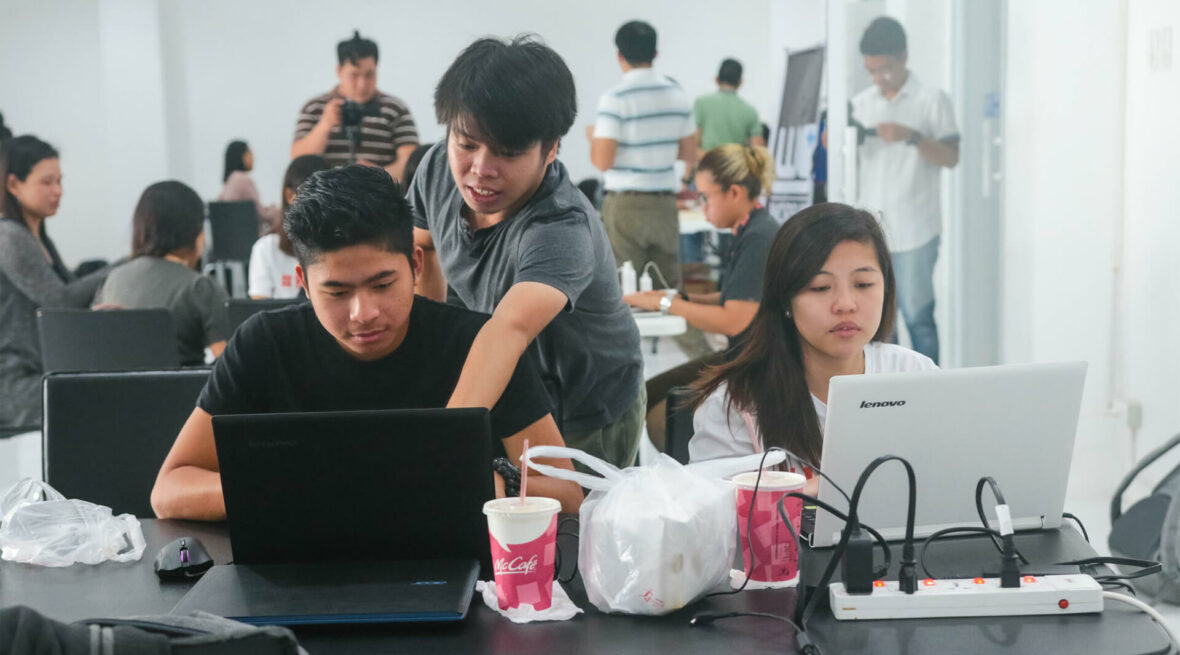Indigitous #HACK returned for its seventh edition this year. The global missional hackathon took place in 66 cities and 42 countries around the world, with the first events starting on October 7 and most of them wrapping up by October 30. There are still a few more #HACK locations to go, with the hybrid event in João Pessoa, Brazil running through November 25, the Bangkok, Thailand event taking place November 26-27, and Accra, Ghana taking place in February of next year. Meanwhile, 300 people have taken part in a virtual hackathon experience, collaborating at a distance.
People gathered in each of these locations to spend a weekend working on missional projects, to use their talents for God and help make Jesus known and make a positive impact on their communities. For many, it was their first Indigitous #HACK experience and the first time that they’ve seen that God can use the talents and interests He has given them. For many others, it was a return to an event that had inspired them in the past.
On October 27, project leaders presented their work live to be examined by a panel of global judges. The following day, during our Global Celebration, we honored the top projects of #HACK2022.
It’s impossible for a single blog post to show what God did during Indigitous #HACK2022. And we’re certain that He did a lot more than just project work. The event is also about fellowship and worship, about finding a place to contribute to missions, about serving God, and most of all, about bringing the Gospel to the unreached and helping the name of Jesus to be known. Though every project at #HACK2022 is significant, our panel of judges singled out these twelve for special recognition.
Infinite1 (Korea): Top Overall Project
One of the most powerful things we can do as followers of Jesus is pray for others. A team in Korea created a platform to help Christians around the world leave location-based prayer threads.
Alternative Voice Reporting (Virtual): Global challenge selection
In partnership with International Justice Mission (IJM), a virtual team sought to fight against growing instances of online sexual abuse and exploitation involving children. In the Philippines, there is a lack of knowledge that it is a crime, a lack of confidence in reporting the crimes, and fears about retaliation and involvement of the local authorities.
To help with these problems, the team created a suite of seven voice products to report online sexual exploitation. At the end of the hackathon, they had working minimum viable products (MVP) for all seven products, including a redesign of the IJM webpage, chatbots, content for a voicemail system, and more.
“I love the idea of an alternative option to text,” says Marie-Ange Eyoum Tagnue, head of product at Yahoo and one of #HACK2022’s global judges.
SOS Priority Project (Virtual): Global Challenge Selection
Working on a challenge from Finishing The Task, a virtual team worked on a solution to leverage data on suicidal tendencies in order to enable Christians to better pursue evangelistic opportunities in areas where cases of suicide are the highest. People who are feeling suicidal are more open to faith and people who have a relationship with God are less likely to commit suicide. The team created a strategy to find priority targets among people contemplating suicide through highlighting the hotspots of suicides across America.
“The thing that I loved about this project is its potential for the way that it married two types of data that might not normally be viewed together,” says Josiah Palusky, a #HACK2022 global judge who is lead software developer at Renew World Outreach. “You’re identifying opportunities based not just on where people aren’t, but based on the darkest places. You’re able to say where the greatest need is.”
Digital Incubator for Church Startups (USA): Global Challenge Selection
Starting a new church is a daunting task with no shortage of challenges. A team in the United States created a solution that provides community, mentorship, and coaching to help new church leaders connect with each other.
Tone (Philippines): People’s Choice Award
A team in the Philippines also worked on the child exploitation challenge for IJM. They created Tone with a goal to educate, encourage reporting, and spark a movement publicizing the exploitation of children. The team created a five-point strategy:
- Report: Victims and concerned individuals can report incidents of exploitation through the website.
- Arrest: The website records all reports and notifies the right NGOs and local government authorities.
- Counsel: The victims can receive counseling to cope with the abuse.
- Support/Shelter: Should the victim have no place to take refuge, NGOs providing shelters for victims would be tapped.
- Prevention: Use analytics and AI to determine hotspots for sexual exploitation.
JWALK (USA): Special Commendation
A team in the U.S. focused on the importance of Christian community. They looked at data showing parts of the United States where people are least likely to know their neighbors. Their goal was to connect people to their local communities through prayer and service. They created JWALK, an app that gathers people to pray and go on prayer walks together.
Reporting Online Exploitation (Australia)
Participants in Australia also took on the IJM challenge of helping connect the community to local enforcement to be able to report online exploitation of children. This team created a one-click reporting system that makes it easy to submit a report and all relevant data to the appropriate authorities. At the end of the event, the team successfully completed an API that makes it possible to put a button on a website or app and submit information as a report fairly anonymously.
MDataHub (Nigeria)
A team in Nigeria took on the challenge of helping close some missional gaps. Their project was all about harnessing public data to identify evangelistic opportunities. Using public data, the team created a web platform to visualize curated data to aid in decision making for evangelism.
World Migration (Thailand)
A team in Thailand worked on a challenge for the Joshua Project that uses their data to identify where the least-reached people groups seek refuge from hostile nations and where the Gospel might be most effective.
GrowthBot (Nigeria)
A team in Nigeria took on the challenge of spiritual growth by creating a chat system that provides automated discipleship with follow-up materials.
Stories to Inspire (Nigeria)
“The harvest is plentiful, but the laborers are few,” Jesus says in Matthew 9:37. A team in Nigeria took on the challenge of raising up more laborers, using stories to inspire church planters into the harvest for multiplying churches.
Welcome Church (Canada)
Whenever a Christian moves to a new area, one of the most important tasks is to find a new church home, but “church shopping” can quickly become tedious and can result in people never settling into a new church. A team in Canada created Welcome Church, a platform designed to help those who relocate network with other churchgoers and find a place to worship.

